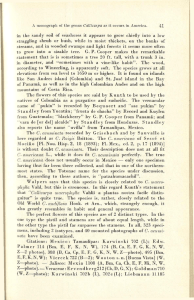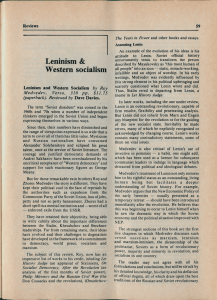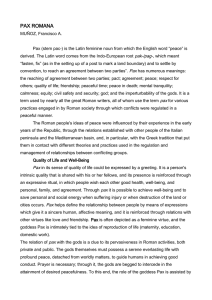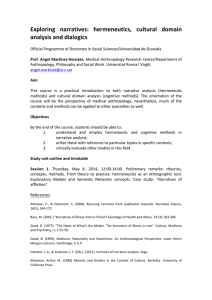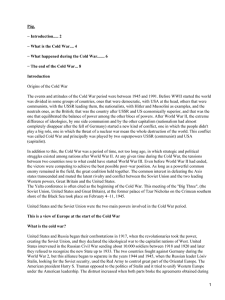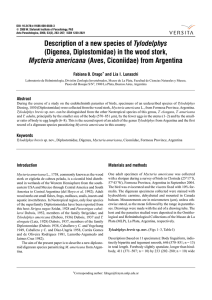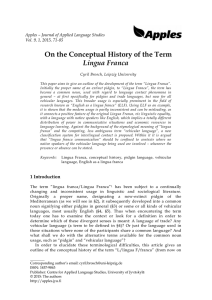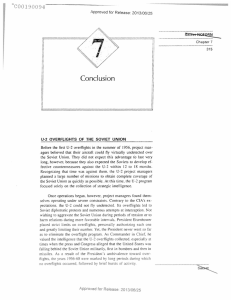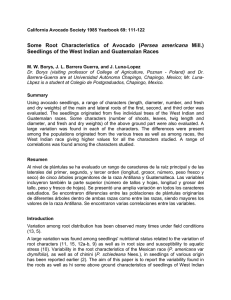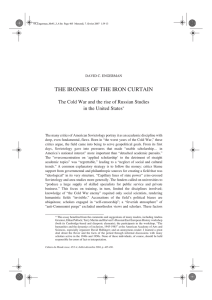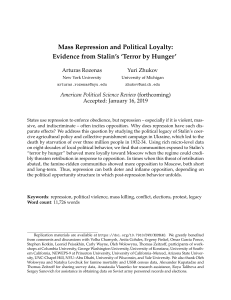The Principles of Pax Americana
Anuncio
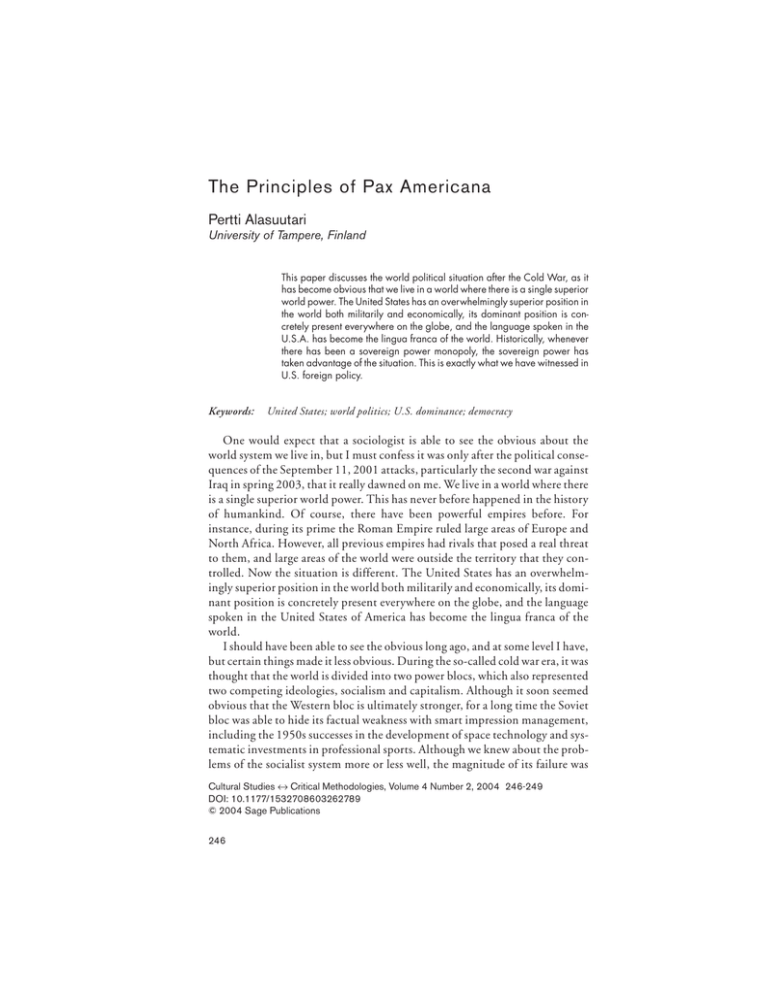
10.1177/1532708603262789 Cultural Alasuutari Studies • The Principles ↔ Critical of Pax Methodologies Americana • May 2004 ARTICLE The Principles of Pax Americana Pertti Alasuutari University of Tampere, Finland This paper discusses the world political situation after the Cold War, as it has become obvious that we live in a world where there is a single superior world power. The United States has an overwhelmingly superior position in the world both militarily and economically, its dominant position is concretely present everywhere on the globe, and the language spoken in the U.S.A. has become the lingua franca of the world. Historically, whenever there has been a sovereign power monopoly, the sovereign power has taken advantage of the situation. This is exactly what we have witnessed in U.S. foreign policy. Keywords: United States; world politics; U.S. dominance; democracy One would expect that a sociologist is able to see the obvious about the world system we live in, but I must confess it was only after the political consequences of the September 11, 2001 attacks, particularly the second war against Iraq in spring 2003, that it really dawned on me. We live in a world where there is a single superior world power. This has never before happened in the history of humankind. Of course, there have been powerful empires before. For instance, during its prime the Roman Empire ruled large areas of Europe and North Africa. However, all previous empires had rivals that posed a real threat to them, and large areas of the world were outside the territory that they controlled. Now the situation is different. The United States has an overwhelmingly superior position in the world both militarily and economically, its dominant position is concretely present everywhere on the globe, and the language spoken in the United States of America has become the lingua franca of the world. I should have been able to see the obvious long ago, and at some level I have, but certain things made it less obvious. During the so-called cold war era, it was thought that the world is divided into two power blocs, which also represented two competing ideologies, socialism and capitalism. Although it soon seemed obvious that the Western bloc is ultimately stronger, for a long time the Soviet bloc was able to hide its factual weakness with smart impression management, including the 1950s successes in the development of space technology and systematic investments in professional sports. Although we knew about the problems of the socialist system more or less well, the magnitude of its failure was Cultural Studies ↔ Critical Methodologies, Volume 4 Number 2, 2004 246-249 DOI: 10.1177/1532708603262789 © 2004 Sage Publications 246 Alasuutari • The Principles of Pax Americana quite well covered by a strict control of the media. In addition, it succeeded in affecting the international popular opinion by supporting and promoting world peace, which also made it difficult for the people who supported its policy to see how weak it really was. The unclear threat of the Soviet Union and the ability of countries such as Vietnam to successfully fight the U.S. army also strengthened the impression that the United States is not the only superpower. Behind this collectively produced smoke screen that prevented us from realizing what we in fact witnessed, the U.S. economic, military, and cultural dominance grew stronger throughout the postwar era. For instance, in the 1950s and early 1960s, German was still quite popular as the first foreign language among grammar school pupils in Finland and many other (non-Englishspeaking) European countries, but then it became more and more clear that English is the number one international language, even if some other nations, for instance, the French, tried desperately to defend their own mother tongue. The same was true of art and popular culture, especially music and film: The U.S. cultural industry has gained a dominant position despite attempts to block its world invasion with the means of economic and cultural protectionism, which in the Eastern bloc meant that the state tried to isolate its citizens from all international media flows. I suppose I have not been fully able to realize the U.S. dominance in the world because I have been quite used to and comfortable with it. For one thing, English is by far my strongest foreign language and, despite the problems that the English-language dominance creates, I am pleased with the possibilities that a lingua franca opens for us all on this globe. During the Roman Empire, Latin played the same role, but on a much more modest scale. Because we need a common language, why not English? I can say the same about the U.S. victory in the cold war: I am pleased it was the United States, not the Soviet Union. After all, the constitution of the United States continues the tradition of the French Revolution, and I believe that honoring equality, democracy, and human rights is the best way to organize society. I cannot even properly imagine what the victory of the Soviet Union would have meant for the world; we would be forced to comply with the official truth, and probably there would be a huge number of dissidents locked away in prisons or concentration camps. Although the international spread of U.S.-produced mass culture could be fought or slowed down by cultural protectionism, I have never bought the recipe because of this alternative prospect. I think it is better to rely on the people and trust that a free, worldwide marketplace of ideas and other media content will best serve the interests of humanity. The idea that we live now in a world sovereignly dominated by one superpower may be rejected by referring to the nature of a global market economy. It can be argued that because the outcome is always dependent on the acts of innumerable independent actors, there isn’t any hierarchy of power or ruler of the world economic system. And even if the U.S. capital owners are a major player in the global market, as Karl Marx (1891/1966) put it, “Capital has no 247 248 Cultural Studies ↔ Critical Methodologies • May 2004 fatherland and . . . workers’ wages are regulated by the unpatriotic international law of supply and demand” (p. 34). In that sense, it can be argued that combined with international organizations such as the United Nations and the World Trade Organization, the global economic and political system is moving toward global governance. So what has dawned on me? In what sense can we talk about U.S. dominance? If history teaches us anything, it teaches that whenever there is a sovereign power monopoly, it will take advantage of the situation. It will impose its own rules upon others; rules that best serve its own interests. In defense of its own security, it will rise above any law or principle that it expects others to honor precisely because it cannot be held accountable. This is exactly what we have witnessed in U.S. foreign policy. For instance, the U.S. government owes the United Nations more than $1 billion in membership dues it has neglected to pay, and it only involves the world organization in its military or other operations when it suits its own interests. In the name of security and the fight against international terrorism, the U.S. administration has adopted the policy of preemptive military strikes on any target on the globe—a policy it would never accept from others. And to preempt its representatives from getting in trouble when, for instance, fulfilling its commands, the U.S. administration has launched a campaign to shield its citizens from prosecution by the new international criminal court for genocide, crimes against humanity, war crimes, and aggression. Threatening with economic and other means at its disposal, the U.S. administration has forced states to sign bilateral immunity agreements. The flip side of the same coin is that the U.S. Patriot Act grants the U.S. authorities practically unlimited possibility to violate people’s civil rights and civil liberties in the name of national security. This is particularly frightening to non-U.S. citizens entering the country, or even regardless of it. If not even U.S. citizens are safe anymore, what about others? What conclusions should we draw from this? I don’t think there are any other means to oppose the arrogant despotism of the U.S. administration than to protest it internationally, to make it plain to see for anyone who bothers to think about it. Many people, especially Canadians, it seems, have decided to protest against the U.S. administration by boycotting the United States. They refuse to travel there anymore. I can quite well understand that reaction, particularly because a non-U.S. citizen feels increasingly vulnerable, deprived of any human rights when entering the country. On the other hand, the paradox of the world situation is that we are increasingly dependent on the popular opinion of the U.S. people. I don’t think isolating them all from the international community is a good strategy. Nor should we express our anger toward U.S. tourists or treat them as embodiments of U.S. arrogance; doing that, we would commit ourselves to a form of racism. That would also contribute to creating a unity among the U.S. people against all foreigners who disapprove of them and their government. Instead, we should support the U.S. citizens who protest against Alasuutari • The Principles of Pax Americana the U.S. foreign policy. We should help them get the message across that in its policy, the U.S. government should do its best to show that it really made a difference that the United States won the cold war, that for the U.S. government the principles of liberty, fraternity, and equality are not just vacuous words. We should support our U.S. friends in passing the message that true patriotism extends beyond any enclosed circle of people. In a broader sense, it depicts fraternity toward and caring for other people and their human rights. One would have expected an undemocratic state like the Soviet Union to violate international law and human rights, but to honor the principles of its constitution, the United States should do better. Reference Marx, K. (1966). The civil war in France. Peking, China: Foreign Languages Press. (Original work published 1891) Pertti Alasuutari is professor of sociology and Director of the Research Institute for Social Sciences at the University of Tampere, Finland. He is editor of the European Journal of Cultural Studies, and his books include Social Theory and Human Reality (forthcoming in June), Rethinking the Media Audience (Sage 1999), An Invitation to Social Research (Sage 1998), Researching Culture: Qualitative Method and Cultural Studies (Sage 1995), and Desire and Craving; A Cultural Theory of Alcoholism (SUNY Press 1992). 249
